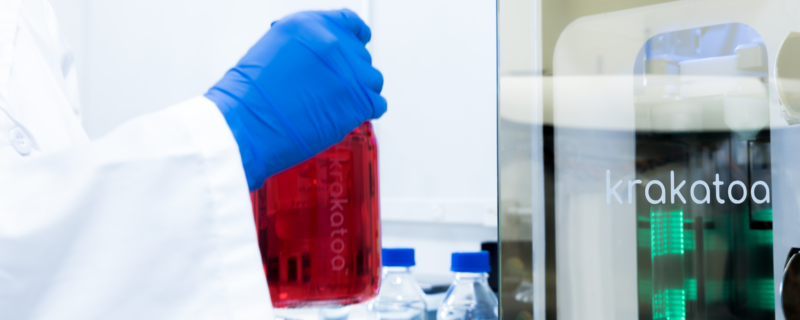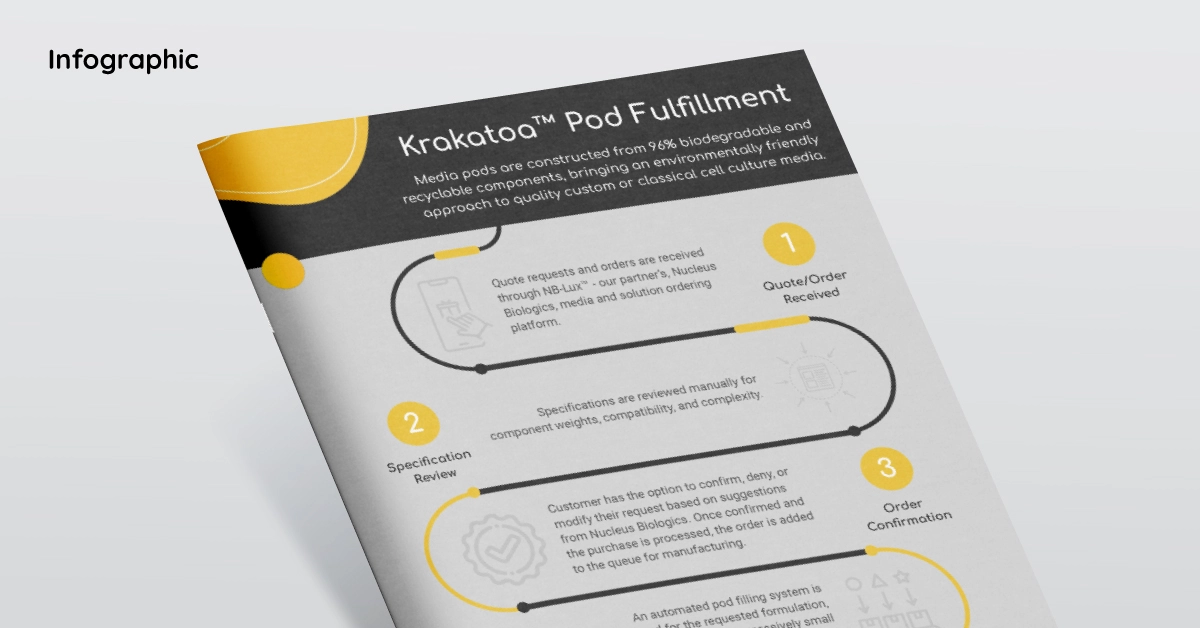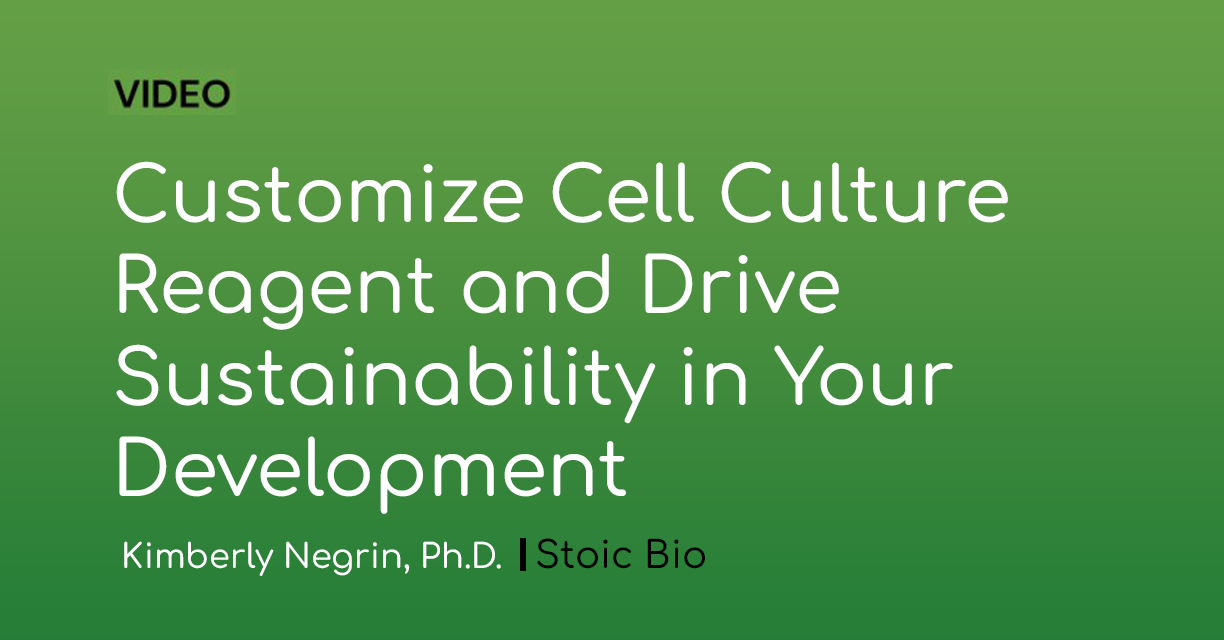Nucleus Biologics recently announced the distribution of Stoic Bio’s Krakatoa™, a point-of-use media manufacturing system aimed at improving the industry’s environmental impact.
Nucleus Biologics plans to cure people + planet. Not many biologics companies have such bold goals, but Nucleus Biologics has come up with a strategy that will not only disrupt the cell culture media market, but help save the planet. In this 4-part blog series, we introduce the four main pillars that support Krakatoa, an innovative point-of-use cell culture media manufacturing system that was developed by Stoic Bio, a spinoff of Nucleus Biologics, that will change how the pharmaceutical industry handles biologics. The first of these pillars is sustainability.
Pharmaceutical industry biological media logistics are a big problem
The cell and gene therapy industry holds enormous medical potential; the prospect of treating or curing a wide range of life-threatening diseases. What remains unspoken, however, is that experts have calculated that the carbon footprint of the pharmaceutical industry is significantly worse than the automotive industry. [1] Moreover, the industry is poised to grow substantially over the next decade, making innovative and sustainable solutions more important than ever.
The biological products that form the foundation of this industry make up a whopping 40% of the global pharmaceutical product pipeline. That means 40% of this 1.1 trillion-dollar market is grown in liquid media, which has a massive environmental footprint. Reducing that footprint is critical to sustainable growth.
Liquid cell culture media is extremely resource-intensive. Because culture media must be manufactured in a clean, regulated environment, it requires the use of immense amounts of plastics. Tank liners and tubing suitable for 2,000 to10,000-liter tanks are regularly used for cell culture media manufacturing. Moreover, traditional cell culture media often ships to customers in 500 mL and 1L non-biodegradable PET bottles or in large plastic bags. An estimated 30 million of these are used annually, all of which are single-use only and will be incinerated with biohazardous waste or remain in landfills for centuries.
Shipping logistics for culture media further contribute to its environmental impact. Media must be shipped in temperature-controlled containers and stored in refrigerator “farms” at the customer site. International shipments can often cost more than the value of the media because of weight. All of these processes are energy-intensive, contributing to the carbon footprint of the industry.
Point-of-use culture media significantly reduces environmental impact
Krakatoa is a point-of-use media manufacturing system that aims to deliver fresh, custom-made cell culture media in a way that is environmentally sustainable and significantly reduces life-cycle cost and environmental impact.
The Krakatoa system replaces liquid media with made-to-order, customized formulations that ship in a sealed package as a mixed powder. Culture media is delivered in biodegradable 500 mL pods containing premixed, powdered media, which are then solubilized at point-of-use using the Krakatoa system. Krakatoa connects to an Ultrapure water source which is then used to solubilize the powdered media. Liquid media is then run through an integrated filter and transferred to a reusable glass bottle, which is recapped inside the instrument under sterilizing UV-C lights. Finally, the label from the media delivery pod can be affixed to the glass media bottle for ease of traceability
The pod shell, which is made of hard, biodegradable, and recyclable plastic loses 90% of its mass a month after disposal. Without the added weight of water, media shipping costs are greatly reduced compared to traditional cell culture media. No cold chain is needed to protect against media degradation, adding to the system’s sustainability. Nucleus Biologics, an authorized distributor for Stoic Bio, also plans to offer a return and recycling service for the pods to further reduce the environmental impact.
To get a more concrete estimate of their reduced carbon footprint, Stoic Bio partnered with the sustainability gurus at Vital Metrics to conduct an in-depth independent life-cycle analysis of the Krakatoa system. The analysis, based on seven different greenhouse gas (GHG) emission parameters, predicts that Krakatoa GHG emissions represent a 65% reduction compared to conventional cell culture media GHG emissions over the life cycle of a typical 500 mL volume of media. In particular, Krakatoa reduces the negative impacts of transportation by 86% and end of life by 88%. In a hypothetical scenario of 50 million liters of cell culture media produced, replacing 100% of traditional media with Krakatoa media would be the equivalent to taking 65,388 passenger vehicles off the road.
Nucleus Biologics has already garnered media attention for its innovative solution to supply chain challenges during the height of the COVID-19 pandemic. [2] Now, the company is making waves by introducing innovative solutions to what is arguably the greatest challenge of our era, environmental sustainability. Please visit our website and the Nucleus Biologics website to learn more about how to “green” your own research.
Stay tuned for next week where we discuss how point-of-use media manufacturing improves media potency and protects therapeutic cell quality!
Krakatoa™ is a registered trademark of Stoic Bio, Inc. Nucleus Biologics LLC is an authorized distributor for Stoic Bio, Inc. of Krakatoa and its related products. Stoic Bio, Inc. is a spinoff of Nucleus Biologics, LLC with similar ownership and was created to develop and commercialize Krakatoa and its related products.
References
- The Conversation. 2019. Big Pharma emits more greenhouse gases than the automotive industry. [online] Available at:https://theconversation.com/big-pharma-emits-more-greenhouse-gases-than-the-automotive-industry-115285 [Accessed 27 May 2019]
- California Life Sciences. 2021. Confronted with shortage of media bags, Nucleus Biologics started designing and manufacturing their own. [online] Available at:https://www.califesciences.org/news/confronted-with-shortage-of-media-bags-nucleus-biologics-started-designing-and-manufacturing-their-own/?hsCtaTracking=1f078fb7-3bdd-4cc6-b4c5-4c9e32082434%7C3ae32ded-f483-4e2c-8481-b27cdc3c7a1e&utm_content=191894620&utm_medium=social&utm_source=linkedin&hss_channel=lcp-10701248 [Accessed 22 December 2021]



